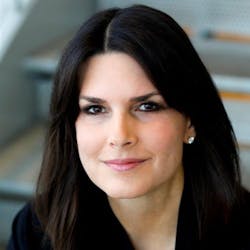Chicago-based Medical Home Network (MHN), a nonprofit organization focused on transforming care in the safety net, is partnering this year with 64 federally qualified health centers (FQHCs) in seven states to participate in two CMS value-based programs: ACO REACH and the Medicare Shared Savings Program (MSSP).
MHN provider partners participating in the NeueHealth Premier ACO achieved $10.1 million in gross savings and a 100 percent quality score in the 2022 performance year.
This will be the first year MHN participates in the MSSP, and the second year participating in the ACO Realizing Equity, Access and Community Health (REACH) Model. Together, these ACOs will cover nearly 50,000 Medicare lives.
MHN supports care transformation by helping FQHCs build whole-person care coordination capabilities at the practice level — powered by AI-driven, real-time analytics and information that gives a full picture of a patient’s health.
In an interview with Healthcare Innovation, Cheryl Lulias, president and CEO of MHN and CEO of the Medical Home Network REACH ACO, said, “I think there’s a really big story here about FQHCs embracing value-based care. I think it is vital to their future sustainability.”
She said MHN has always partnered with FQHCs. “We've always recognized their value to the safety net,” Lulias added. “They take care of over 30 million Americans. One in 11 Americans receives their care from an FQHC, so they're a really important segment. People 65 and older make up the fastest-growing cohort of the patients they serve. We recognized through our work that FQHCs needed a value-based care strategy for Medicare.”
Lulias noted that before the pandemic, FQHCs were excluded from many value-based programs. “Now they are included because CMS has been very intentional with their macro goals of 100 percent of traditional Medicare in value-based care by 2030 and 50 percent in Medicaid,” she said. “FQHCs are a huge segment, and CMS is working to provide the facilitative programming and financing to enable them to get on the value-based care path. It is a paradigm shift, which is really exciting.”
Seventeen FQHCs in California, Illinois, Indiana, Michigan and New York make up Medical Home Network Health Alliance ACO, MHN’s new MSSP ACO that started in 2024. Lulias also serves as CEO for this ACO.
One of its MSSP partners is Eisner Health, which provides medical and dental services in downtown, South L.A. and the San Fernando Valley in California to low-income individuals and families.
“For almost 104 years, Eisner Health has provided high-quality, coordinated care for our patients. Joining the Medicare Shared Savings Program with MHN will allow us to further develop our care management processes, collaborate with community health centers across the country, share and learn best practices, and improve the health and well-being of our fee-for-service Medicare patients,” said Warren Brodine, president and CEO of Eisner Health, in a statement. “MSSP matches perfectly with Eisner Health’s mission. Together, we will improve the health and well-being of the communities we serve,” he added.
Lulias explained that MHN was founded in 2009, and more than 10 years ago it created a technology platform to enable coordinated workflows and communication and better handoffs between different members of the delivery system. They were an early adopter of admission, discharge and transfer (ADT) notifications, for instance.
“Medical Home Network started hyper-focused on Chicago to try and create a better, more coordinated delivery system with the goal of transforming care and improving the health of the safety net,” she said.
Over the years, they refined the model, and when Illinois moved to Medicaid managed care, MHN built the capabilities and infrastructure to manage full risk in a Medicaid ACO.
“We've built care teams at the practice level. They are employed by, and embedded in, the primary care practices," Lulias said. “These care teams — a combination of licensed and unlicensed — manage patients throughout the continuum, across all venues and settings. We work to create a system that works harmoniously in service of the patient. We’ve had quantifiable results, which show that building trusting relationships with the patients at the primary care level while driving care and clinical transformation enabled by technology in a culturally sensitive manner, focusing on the whole person, really drives better care and better outcomes.”
She said that because of their success in Chicago, they wanted to have more of a national impact. “We began expanding from Chicago to other markets and that's where this partnership with NeueHealth started, and we went from Medicaid to Medicare.”
Lulias said that MHN has found FQHCs very receptive to participating in ACO REACH and MSSP, because they have always been focused on whole-person care. “They’ve always recognized the importance of mitigating social determinants to improve health, and value-based care is really aligned with their care model,” she said. “I think FQHCs appreciate the flexibility to innovate and use the care team in a value-based care construct. FQHCs understand the importance of moving away from fee for service and the flexibilities that alternative payment models provide to finance the exceptional care they give.”


